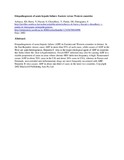| dc.contributor.author | Acharya, KS | |
| dc.contributor.author | Batra, Y | |
| dc.contributor.author | Hazari, S | |
| dc.contributor.author | Choudhury, V | |
| dc.contributor.author | Panda, SK | |
| dc.contributor.author | Dattagupta, S | |
| dc.date.accessioned | 2013-07-04T06:17:36Z | |
| dc.date.available | 2013-07-04T06:17:36Z | |
| dc.date.issued | 2002 | |
| dc.identifier.citation | KIRTDA, DRACHARYAS. 2002. Acharya SK, Batra Y, Hazari S, Choudhury V, Panda SK, Dattagupta S.Etiopathogenesis of acute hepatic failure: Eastern versus Western countries.J Gastroenterol Hepatol. 2002 Dec;17 Suppl 3:S268-73 | en |
| dc.identifier.uri | http://profiles.uonbi.ac.ke/sacharya/publications/acharya-sk-batra-y-hazari-s-choudhury-v-panda-sk-dattagupta-setiopathogenesis- | |
| dc.identifier.uri | http://erepository.uonbi.ac.ke:8080/xmlui/handle/123456789/44998 | |
| dc.description.abstract | Etiopathogenesis of acute hepatic failure (AHF) in Eastern and Western countries is distinct. In the East hepatitis viruses cause AHF in more than 95% of such cases, while causes of AHF in the West are quite heterogenous. Hepatitis E virus is the major etiological agent of AHF in countries like India where the virus is hyperendemic. Occult HBV infection may also be causing AHF in a sizable proportion of cases in areas where chronic HBV infection frequency is high. Paracetamol causes AHF in about 70% cases in the UK and about 20% cases in USA, whereas in France and Denmark, non-steroidal anti-inflammatory drugs are more frequently associated with AHF. Hepatitis B virus causes AHF in about one-third of cases in the latter two countries. Copyright 2002 Blackwell Publishing Asia Pty Ltd | en |
| dc.language.iso | en | en |
| dc.title | Etiopathogenesis of acute hepatic failure: Eastern versus Western countries | en |
| dc.type | Article | en |

